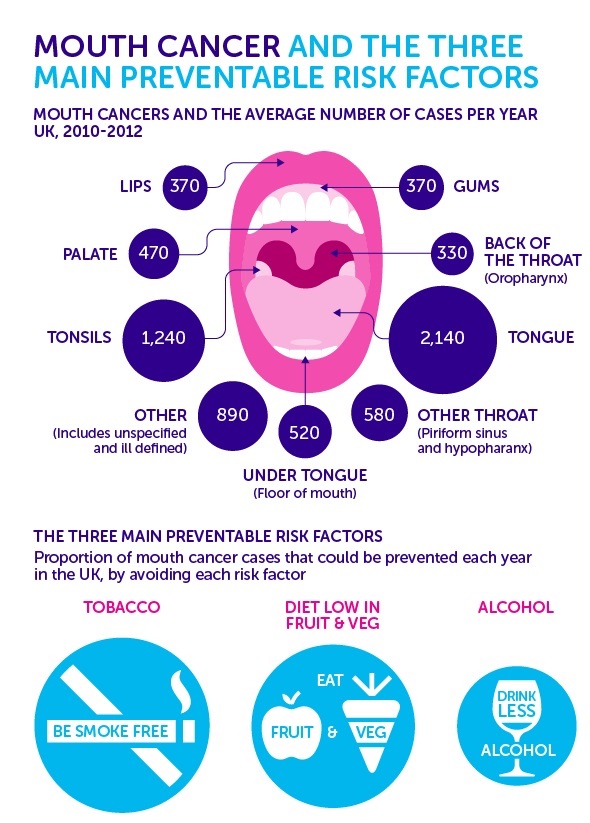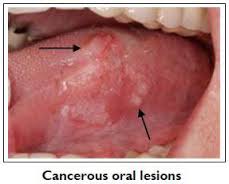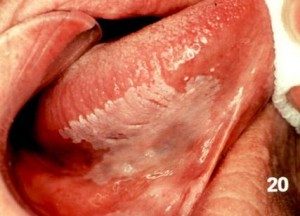Oral Cancer – The Facts
Here at Vitality, we take your health very seriously. We carry out dozens of oral cancer screenings every week. All patients have an oral cancer screening as part of every full dental examination.
The examination includes a dental health history to look at risk factors, plus an examination of all the soft tissues of the mouth, especially the tongue and floor of the mouth. We will check thoroughly for any swellings or tissue blemishes such as ulcers or white patches.
Throughout the UK, there is a strict 14 day NHS referral scheme for suspected cancer and our promise is that we will make a referral to your local hospital ON THE DAY that we detect anything of concern.
Oral Cancer – The Symptoms
Ulcers that do not heal are by far and away the most common symptom. At Vitality, we ask that if you notice an ulcer that has not healed within three weeks that you get in touch with us for an additional oral cancer screening. In many cases, changes are seen in the mouth before the cancer develops. This means that early treatment of these changes will actually prevent a cancer developing.
Other symptoms include:
•White patches anywhere in your mouth
•Red patches anywhere in your mouth
•A lump on the lip, tongue or in the mouth or throat
•Unusual bleeding or numbness in the mouth
•Pain when chewing or swallowing
•A feeling that something is caught in the throat
•Unusual bleeding or numbness in the mouth
•Loose teeth or dentures feeling uncomfortable and not fitting properly
•A change in your voice or speech problems
•Weight loss
•A lump in the neck
•If the cancer spreads to other parts of the body, various other symptoms can develop
All of these symptoms can be due to other conditions, so tests are needed to confirm the diagnosis.
Oral Cancer – Survivial
Although oral cancer is uncommon in the UK, it seems to be getting more common, whereas many other cancers seem to be getting less prevalent. Rates of oral cancer have increased by 68% in the last 20 years. There are around 4,700 cases that are diagnosed each year. It is twice as common in men as it is in women and is rare in people aged under 40. Most cases are diagnosed by dentists rather than doctors.
The statistics for survival of oral cancer have not improved as much as those for other types of cancer. As with all cancers, early detection and early treatment is key, and it has a huge impact on the chances of survival. The outlook for people with mouth cancer is very good if it is diagnosed early.

Oral Cancer – Risks and causes
The risks and causes of mouth and oropharyngeal cancer include lifestyle factors and other medical conditions. See what you can do to reduce your risk.
We don’t know what causes most mouth or oropharyngeal cancers. But there are some factors that may increase your risk of developing it.
Having any of these risk factors does not mean that you will definitely develop cancer.
Alcohol
Drinking alcohol increases your risk of mouth and oropharyngeal cancer, especially when combined with smoking. Research shows around 30 out of 100 (30%) of mouth and oropharyngeal cancers are caused by drinking alcohol.
UK guidelines suggest a maximum of 14 units of alcohol a week for both men and women.
Smoking
Smoking tobacco (cigarettes, pipes, cigars) increases your risk of developing mouth and oropharyngeal cancer. Research suggests that more than 60 out of 100 (more than 60%) of mouth and throat cancers in the UK are caused by smoking.
People exposed to second hand smoke (passive smoking) at home or in the workplace have a small increase in their risk of mouth and oropharyngeal cancer.
Chewing tobacco or betel quid
Chewing tobacco (smokeless tobacco) or betel quid (gutkha) is known to cause mouth and oropharyngeal cancer. It is not a safe alternative to cigarettes. It is very common in parts of Asia, Europe and USA.
Diet
A poor diet may increase your risk of some types of mouth and oropharyngeal cancer. This might be due to a lack of vitamins and minerals, such as iron or folic acid. Poor diet can lead to a breakdown in oral mucosa, making it more prone to developing cancer. A well balanced diet usually means you are getting enough vitamins and minerals.
Human papilloma virus (HPV)
Viruses can cause some cancers. You don’t catch cancers like an infection. But the virus can cause cell changes making them more likely to become cancerous in the future.
There are many types of HPV. Mouth and oropharyngeal cancer are especially linked to type 16.
Human papilloma virus is a sexually transmitted infection. It is very common. For many people, HPV causes no harm and goes away without treatment. Only a very small percentage of people with HPV develop mouth or oropharyngeal cancer.
The risk of HPV infection in the mouth and throat is linked to certain sexual behaviours, such as oral sex and having a higher number of sexual partners. Smoking also increases the risk of HPV infection in the mouth.
Weak immune system
Your body’s immune system fights infection. Some illnesses and medication can weaken your immune system. Research shows an increased risk of mouth cancer if you are:
- having treatment for HIV or AIDS
- taking medicines to suppress your immune system after an organ transplant
Sunlight and sunbeds
Skin cancers are relatively common on the head and neck as these areas are often exposed to ultraviolet (UV) light. Melanoma (skin cancer) can develop on the lip.
Both the sun and tanning beds give off UV rays. These rays can cause cancer in unprotected skin. Some studies have shown an increase in skin cancer in people who regularly use sunbeds.
Previous cancer
People who have had oral cancer have an increased risk of getting it again. People who have some other types of cancer are also at increased risk.
Mouth conditions
Changes can happen in the cells in the lining of the mouth. They can appear as red or white patches in the mouth. In some people, these conditions may develop into cancer over some years. At Vitality, we can spot these patches during your oral cancer screening so it is important to visit us regularly.
Further help and information on Oral Cancer
The Mouth Cancer Foundation
www.mouthcancerfoundation.org
Supports people with mouth, throat and other head and neck cancer.
Macmillan Cancer Support
Helpline: 0808 808 0000
www.macmillan.org.uk
Provides information and support to anyone affected by cancer.
CancerHelp UK
http://cancerhelp.cancerresearchuk.org
Provides facts about cancer, including treatment choices.


